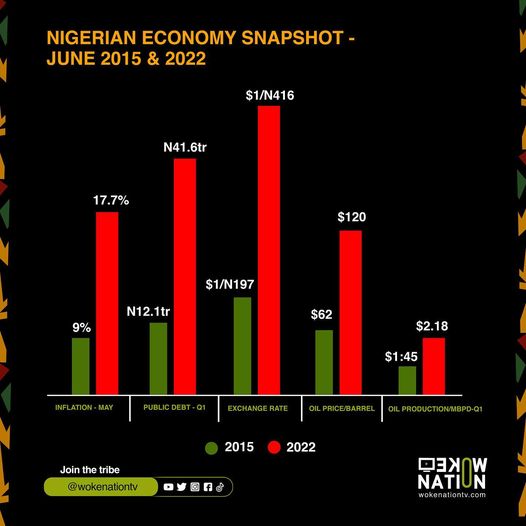Published
1 year agoon


According to the World Bank, Nigeria’s situation is getting worse, and Nigeria’s economy is doing less well because inflation is still going on.
This is what the Washington-based bank said in its recent Nigeria Development Update, which was released Thursday in Abuja along with the Nigeria Country Economic Memorandum.
Nigeria is in a difficult and deteriorating economic situation, according to the NDU report. Since the previous Nigeria Development Update, titled “The Continuing Urgency of Business Unusual,” was released in June 2022, Nigeria’s economic performance has deteriorated.
Also, the bank lowered its prediction for Nigeria’s growth in 2022 from 3.8% to 3.1%.
The modest economic growth in the third quarter compared to a year earlier, slowed by the oil sector and dismal performance in other economic sectors, was cited as the cause of the modification.
The bank also predicted that growth would drop by 2.9% in 2023.
The World Bank has lowered its growth predictions for Nigeria as the country’s economic production growth has slowed. Real gross domestic product at market prices increased by 2.4 percent year over year in the third quarter of 2022 as a result of ongoing declines in oil production (-22.7% y-o-y) and sluggish non-oil growth (4.3 percent y-o-y, down from 4.8 percent y-o-y in Q2 2022). Real GDP growth is now expected to be 3.1% in 2022 and 2.9% in 2023–24, down 0.3% from the previous estimates at the time of the June 2022 NDU, according to the World Bank.
Wages lose value by 35%.
The World Bank’s lead economist for Nigeria, Alex Sienaert, stated during his presentation of the reports that the current value of the Nigerian minimum wage, which was N30,000 in 2019, is N19,355.
This indicates that as inflation erodes Nigerians’ purchasing power, there was a value loss of 35.48% between 2019 and 2022.
“The cumulative inflation between 2019 and 2022 was 55%,” wrote Sienaert.
He said that Nigeria’s buying power has fallen as a result of growing inflation.
According to NDU research, consumer price inflation has increased and is now among the highest in the world.
The report observed that although the CBN was attempting to reduce rising inflation by raising interest rates, it had found it difficult due to its support of the fiscal deficit through technological developments.
multiple difficulties
According to the survey, consumer price inflation is currently among the highest in the world. The consumer price index, which was already rising quickly, picked up speed in 2022 and reached a 17-year high of 21.1% year over year.
“Nigeria has experienced persistently high inflation for the past 20 years, but since 2019, inflation has significantly increased due to multiple exchange rates, exchange rate depreciation in the parallel market, tighter trade restrictions, and the Central Bank of Nigeria’s monetization of the public deficit.”
“By 2022, this will be made worse by the rise in global food and energy costs brought on by the conflict in the Ukraine and supply interruptions on a worldwide scale.” In response, the CBN has tightened monetary policy since May 2020, raising the policy rate by 500 basis points and the minimum amount of cash reserves required by 500 bps. The continued monetization of the budget deficit, sector-specific subsidized credit provisions, and rises in the price of imported food and energy, however, have lessened the disinflationary effect of these policies.
The research also found that Nigeria’s exchange rate policy settings are making macroeconomic risks worse and making it harder for businesses, investors, and the economy to grow.
More than 5 million Nigerians live in poverty.
The World Bank also reported that between January and October of this year, inflation drove five million Nigerians into poverty.
According to the report, inflation will cause up to 5 million Nigerians to become impoverished by 2022. According to the World Bank, inflation raised the overall number of poor people to roughly 90 million between 2020 and 2021, pushing about eight million additional Nigerians below the poverty line. Between January and September 2022, it is predicted that rising inflation will drive five million more Nigerians into poverty. This was primarily due to higher costs for local staples, including rice, bread, yams, and wheat, especially in urban areas.
The Nigerian economy, according to the Washington-based bank, is extremely susceptible to shocks.
It said that if inflation and unemployment kept going up, the level of fear in the country would rise.
The research said that Nigeria’s economy would continue to be very vulnerable to both domestic and international shocks if urgently needed policy steps to lower inflation, boost fiscal revenues, and move toward a market-responsive exchange rate were not taken.
READ ALSO : Inflation in Ghana reached a 21-year high of almost 50% in November
If inflation and unemployment stay high, it will make it harder to keep the country safe from outside threats. This could also slow economic growth.
The bank says that Nigeria’s rising inflation has gotten worse since 2020, making it harder for people to buy things and making poverty worse.
Since 2020, Nigeria’s high, ongoing inflation has gotten worse, reducing people’s purchasing power and escalating poverty. Nigeria’s inflation rate has been consistently high since October 2019. Following the closing of Nigeria’s land borders in October 2019, inflation picked up speed and continued to rise gradually into 2020 as a result of local supply shortages brought on by the COVID-19 epidemic. With an average rate of 17 percent in 2021, inflation was higher than it had been over the previous four years and was among the highest rates worldwide.
Nigerian digital media platform. We cover all trending and significant topics, real online news no fake news



